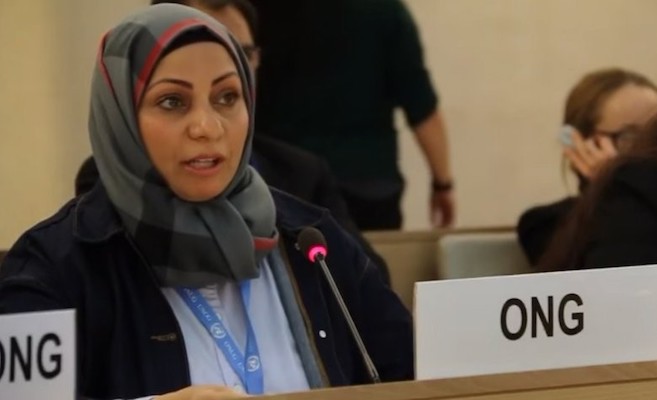29 September 2017 – Today the Bahrain Institute for Rights and Democracy (BIRD) and Americans for Democracy & Human Rights in Bahrain (ADHRB) have learned that detained human rights defender Ebtesam al-Saegh has been subjected to further arbitrary harassment by authorities at Isa Town Women’s Detention Center, where she has been held since July. In the latest incident Ms. al-Saegh, who has been tortured and imprisoned for her human rights work, is being punished for hugging and kissing members of her family during a prison visit earlier this week.
Prison authorities in Bahrain inconsistently bar physical contact between detainees and family members. Previously at Isa Town prison, where Ebtesam and other female detainees are held, families were granted more private visits in which they could sit in a room with their loved ones and interact with some degree of freedom. They were monitored by a security camera but guards were not present. More recently, however, the conditions on family visits have been made far more onerous and degrading, with guards present in the room listening to the conversation and the detainees forced to sit on the opposite side of a long table from their families. Depending on the mood of the guard, physical contact may or may not be allowed to pass without discipline. The unnecessary indignity involved in the family-visitation arrangements has been a major subject of protest among detainees at both men’s and women’s prisons for some months now.
Earlier this week, when Ms. al-Saegh’s family came to visit her, she reached across the table to hug and kiss her children. In response, the prison administration, headed by Officer Maryam al-Bardooli, has banned Ebtesam from seeing her family for two weeks, and will not let her make phone calls to them for a week. There is clearly no safety or legitimate public policy reason behind this decision, as Ms. al-Saegh has never exhibited any tendency to violence. It is evidently an act of unnecessary punishment and reprisal.
The Standard Minimum Rules for the Treatment of Prisoners adopted by the UN General Assembly allow visitation “under necessary supervision” (Rule 58.1). Disciplinary measures that do not meet the test of necessity are incompatible with this standard. The Rules also call for methods “respectful of the inherent human dignity and privacy of the [prisoner]” in the conduct of searches of prisoners’ persons and cells (Rule 50). By analogy, this stricture should apply still more forcefully to the procedures around visits with family, where the connection to the legitimate interest in prison safety is less direct and may be achieved by simple control measures like screening of visitors.
This latest instance of reprisal against a human rights defender follows on the heels of major expressions of concern over Bahrain’s behavior in this regard at the 36th session of the Human Rights Council. In its remarks under Item 4 of the Agenda (“Human Rights Situations that Require the Council’s Attention”) on 19 September, Ireland’s delegation stated that it is “concerned by the severity of the curtailment of civil society in Bahrain, in particular the harassment and reprisals against human rights defenders engaging in national and international advocacy.” Under the same heading, Denmark likewise stated, “We reiterate our call for the immediate cessation of reprisals against human rights defenders as well as the release of all arbitrarily detained persons in Bahrain.” Andrew Gilmour, the UN Assistant Secretary-General for Human Rights, called Bahrain an “egregious case” in the field of reprisals for human rights activism, citing Ms. al-Saegh’s case by name and noting that the charges raised against her are “most likely related to her participation in the March session” of the Human Rights Council. High Commissioner for Human Rights Zeid Ra’ad Al Hussein, offering a broader picture, noted that “the government of Bahrain has imposed severe restrictions on civil society and political activism through arrests, intimidation, travel bans and closure orders, with increasing reports of torture by the security authorities,” while the UN’s good-faith efforts to work with Bahraini authorities “have been met with point-blank denials, unfounded accusations and unreasonable last-minute conditions to technical missions.”
ADHRB and BIRD condemn this latest act of retaliation against an important voice of civil society in the country, and note that Bahrain is taking this abusive action at the very moment it formally embraces the outcome of its third Universal Periodic Review, the UN procedure for review of its human rights record. We call on the international community to acknowledge that, as it gathered in Geneva this week to reaffirm the ideals entrusted to the Human Rights Council, the Bahraini government is denying a prisoner of conscience the basic human decency of embracing her family. We further urge the international community to pressure Bahrain’s authorities to immediately release Ebtesam al-Saegh and all others unfairly detained in the kingdom.





